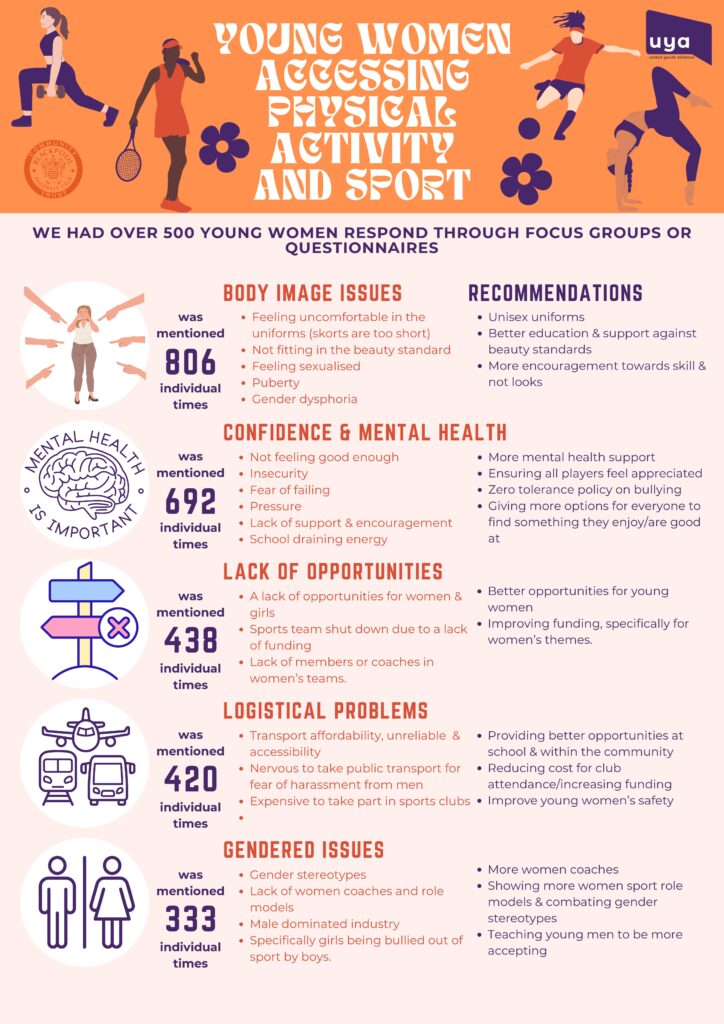Overview
This report presents the findings of a youth-led engagement project commissioned to explore and address the barriers that young women in Blackpool face when accessing physical activity and sport. In collaboration with United Youth Alliance and Blackpool Football Community Trust, alongside local organisations, the initiative was informed by the voices and lived experiences of young women from the area.
Engaging over 500 young women via questionnaires, focus groups, creative sessions, and peer-led discussions, the project uncovered a range of challenges. These included practical issues such as cost and transport, as well as personal struggles concerning body image, confidence, and gender-based exclusion. The insights gained highlighted both known concerns and emerging themes, including the sexualisation of young women in sport and the absence of female coaches. The report culminates in five co-produced recommendations aimed at fostering inclusivity and empowerment in Blackpool’s physical activity landscape.
The Findings
The recent analysis has identified several salient themes that align closely with the concerns raised in the original brief regarding young women’s participation in sports. Foremost among these is the prevalent gender bias and the inequity in sports participation that continues to hinder progress. Additionally, a notable insufficiency in physical education (PE) provision within schools has been highlighted, alongside significant cost barriers which undermine accessibility for many young women.

Motivation appears to be another critical factor, with a pronounced lack of encouragement affecting engagement. Unrealistic body standards and a shortage of diverse role models exacerbate these issues, while confusion about what constitutes physical activity further complicates participation. The impact of messaging, particularly through social media, is evident, creating yet another barrier to involvement. Transport costs and safety concerns also emerged as obstacles, alongside a stark absence of visible national and local female role models.
Two further themes surfaced during the youth engagement process: the lack of women-only opportunities and the poor visibility of available activities. These observations underscore a compelling need for targeted interventions. Quantitatively, the analysis of young women’s voices confirmed the urgency of these challenges, as body image and mental health concerns were frequently cited. Additionally, the findings reflect a crucial need for reframing physical activity perceptions and address the ongoing impacts of the COVID-19 pandemic on structured activity engagement.
The Recommendations
From the research, engagement, and co-production process, five key actionable recommendations have emerged to enhance youth participation in physical activities.
- Establish a Youth-Led Social Action/Steering Group. This group will ensure ongoing advocacy, leadership, and accountability, significantly influencing strategy, funding decisions, and programme delivery.
- Develop a Co-Produced Communication Strategy. This strategy must utilise youth-friendly platforms such as TikTok and Instagram, alongside peer-created content, to promote physical activity as accessible, enjoyable, and flexible. The messaging ought to dismantle prevalent perceptions that equate sport with intimidation.
- Conduct a Local Asset Mapping Exercise. By identifying existing, affordable, and safe venues for physical activity, organisations can collaborate with partners like Move Together Blackpool to present these resources in a youth-accessible format, such as a digital guide.
- Increase female visibility in sport. Investment in the training and recruitment of female coaches, alongside campaigns that celebrate diverse female role models, is essential to challenge existing stereotypes.
- Create a Shared Resource Bank that is co-curated by young women, which will provide valuable guides, local activity lists, and confidence-boosting content. This resource should reflect the real barriers and lived experiences faced by young women in sport.

